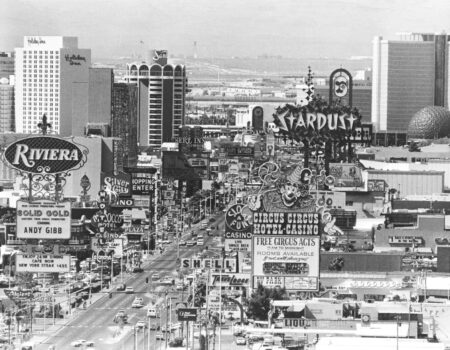Las Vegas, Nevada, is globally renowned for its vibrant nightlife, entertainment, and iconic Strip, but its real estate history is equally fascinating. Over the decades, the Las Vegas housing market has transformed from a small desert town into one of the most dynamic real estate markets in the United States. Here’s a look at how it all began and how the market has evolved over time.
Early Beginnings (1900s–1940s)
Las Vegas started as a modest railroad town in the early 1900s. The completion of the San Pedro, Los Angeles & Salt Lake Railroad in 1905 marked the city’s first major development, with land parcels being auctioned to settlers.
The real estate market during this period was limited, primarily consisting of small homes and businesses catering to railroad workers and settlers. The construction of the Hoover Dam in the 1930s brought thousands of workers to the area, spurring the demand for housing and commercial real estate.
The Casino Boom and Suburban Growth (1950s–1970s)
The 1950s saw the rise of Las Vegas as a gambling and entertainment hub, which transformed its real estate landscape. Iconic hotels and casinos like the Flamingo and Sands attracted visitors from across the world, and the city began to expand outward.
Suburban neighborhoods like Paradise Palms were developed to accommodate the growing population of casino employees and their families. These communities introduced modern housing styles, including the now-iconic mid-century modern homes.
The Era of Master-Planned Communities (1980s–1990s)
As the city’s population grew rapidly in the 1980s and 1990s, developers began creating master-planned communities like Summerlin and Green Valley. These neighborhoods offered residents a blend of residential homes, parks, schools, and commercial spaces.
The real estate market boomed during this era, driven by affordable housing, job opportunities, and an influx of retirees attracted to Nevada’s low taxes. By the 1990s, Las Vegas had become one of the fastest-growing cities in the U.S.
The Housing Bubble and Crash (2000s)
The early 2000s brought unprecedented growth to the Las Vegas real estate market, with soaring property values and rapid construction. However, the housing bubble burst in 2008, devastating the market.
Las Vegas became one of the hardest-hit cities during the Great Recession, with foreclosure rates among the highest in the nation. Home values plummeted, and many neighborhoods were left with vacant homes and unfinished developments.
Recovery and Resilience (2010s–Present)
The Las Vegas real estate market began to recover in the 2010s, driven by economic diversification and the resurgence of tourism. Developers resumed projects, and previously stalled neighborhoods were revitalized.
Master-planned communities like Skye Canyon and Cadence emerged, offering modern homes with amenities tailored to today’s buyers. Luxury real estate also flourished, with high-end neighborhoods like The Ridges and MacDonald Highlands attracting affluent buyers.
The Current Market and Future Outlook
Today, Las Vegas is a thriving real estate market characterized by:
- Population Growth: Steady increases in residents moving to the city for work, retirement, and lifestyle.
- Diversified Economy: Sectors like technology, healthcare, and sports have joined the city’s tourism base, fueling demand for housing.
- Luxury Real Estate: High-rise condos and exclusive gated communities are in high demand, reflecting a market catering to diverse lifestyles.
As the city continues to expand, the real estate market in Las Vegas is poised for further growth. Upcoming developments, such as new sports venues and infrastructure projects, are expected to increase demand for both residential and commercial properties.
Conclusion
The history of real estate in Las Vegas is a testament to the city’s resilience and adaptability. From its humble beginnings as a railroad town to its status as a global entertainment and real estate hotspot, Las Vegas offers a dynamic market with opportunities for every type of buyer.
Whether you’re considering buying a home or investing in property, understanding the city’s real estate evolution provides valuable insights into its vibrant market. Looking to make your mark in Las Vegas real estate? Contact me today to explore your options in this exciting and ever-changing city!




